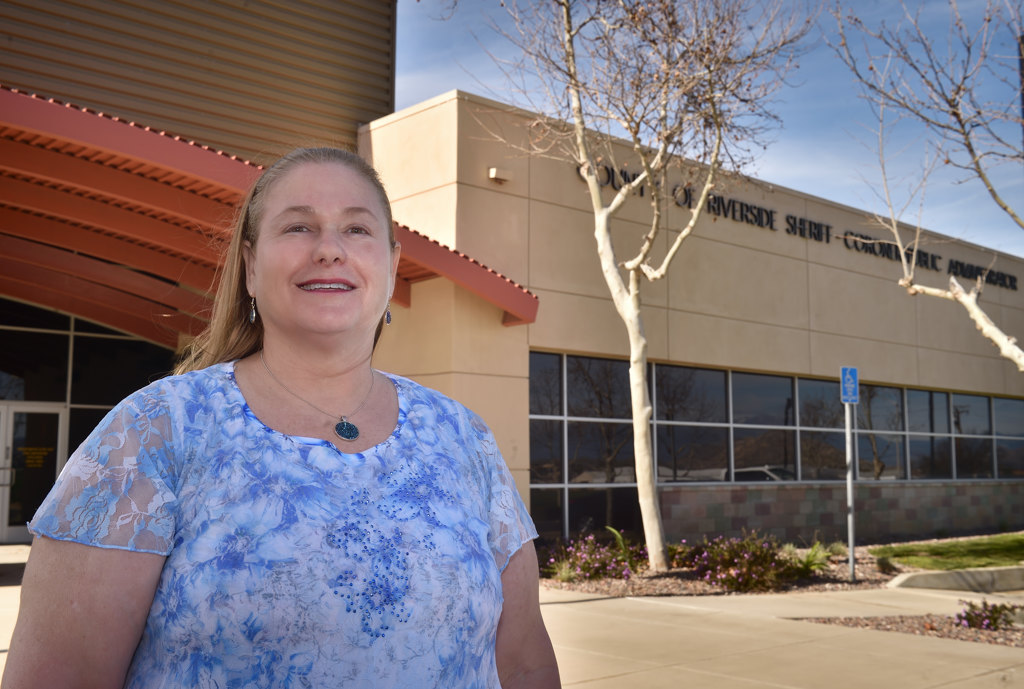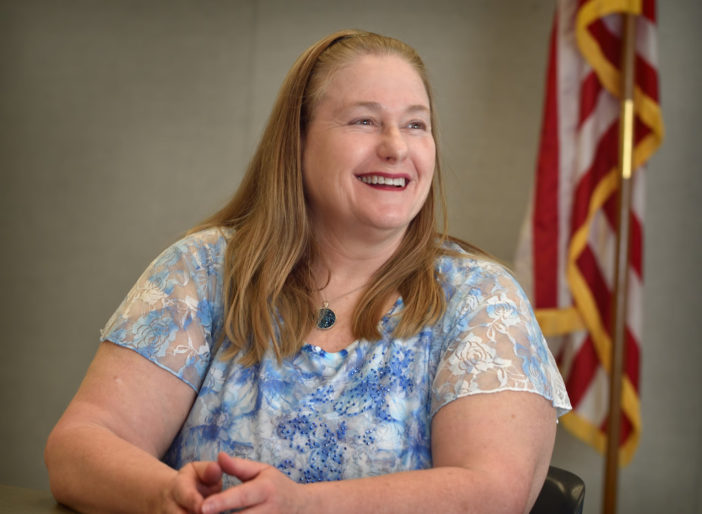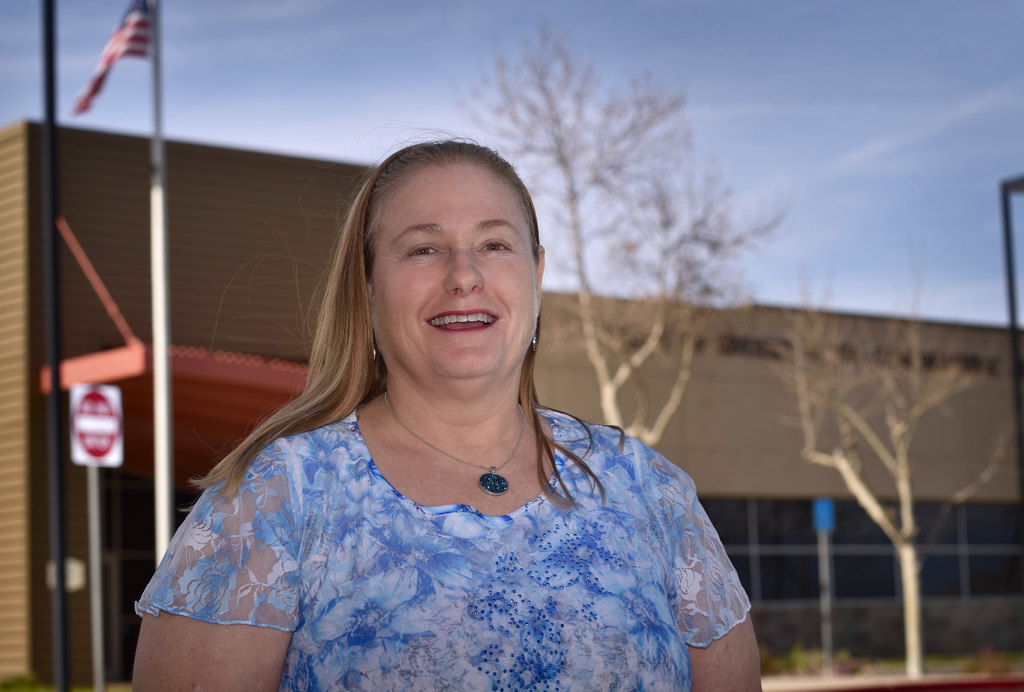For volunteer work, it was pretty heavy stuff.
Back in 1994, three years after she landed her first job with Riverside County as an office assistant in the District Attorney’s Family Support Division, Denise Ferris began volunteering for the County Coroner.
Inspired by a co-worker who was volunteering there, the gig turned out to be right up Ferris’ alley. As a teenager, she was fascinated with the medical examiner TV procedural, “Quincy, M.E.”
Back in 1994, the Coroner was not part of the Riverside County Sheriff’s Department (that happened in 2000). Volunteers were allowed to pretty much do it all, including assisting technicians during autopsies.
Before her first autopsy, Ferris skipped breakfast – just in case. But the process of watching the organs of a female homicide victim (gunshot) be examined by a pathologist didn’t freak her out.
“I was like, I’ve seen worse on television,” says Ferris.
The native of Riverside, who grew up and continues to live in Grand Terrace, took a liking to her volunteer work so much that she went through a two-week academy (it’s all classroom based, with no tactical training) and became a deputy coroner in February 2001.
A big clue Ferris was destined to excel at her job, which she retired from on Dec. 30, 2019, came when she was volunteering.
She was sent to a home of a hoarder who had died.
“I was bit over 100 times by fleas,” Ferris recalls. “My doctor injected me with steroids because I wanted to scratch my skin off.”
But she stuck with it.
Now that’s dedication.
“Truly, the people who are in this line of work, I think we’re all a shade of crazy,” Ferris says with a laugh while recalling her career recently in a conference room at the Riverside County Coroner’s Office on Redlands Avenue in Perris.
“But not in a bad way. It’s just not a job everyone can do.”
BUSY JOB
Ferris was, until recently, one of 26 deputy coroners for the Riverside County Coroner. Because deputy coroners carry a firearm, it’s a sworn position, but they don’t go through the sixth-month academy deputy sheriffs endure.
The job of a deputy coroner is to respond to suicides, accidents, homicides, unattended deaths, etc., to determine the manner and mode of death. A pathologist who is a medical doctor conducts an autopsy to determine the cause of death.
“For example,” Ferris says, “if someone suffers a gunshot to the torso, we determine if it was an accident, a suicide, or a homicide.”

Denise Ferris, recently retired Riverside County deputy coroner, in front of the Coroner officer in Perris.
Photo by Steven Georges/Behind the Badge
The caseload of a deputy coroner is heavy.
Roughly rectangular, Riverside County is 7,208 square miles, many of which are desert. The Coroner has a satellite office in Indio to make things a bit more manageable.
In the last couple of years, most deputy coroners in Riverside County were averaging 400 to 500 cases a year, Ferris figures. Many of the cases were handled only over the phone when it was determined that the deputy coroner didn’t have to go out to the scene and instead release the body to a relative.
“I worked out of this (Perris) office,” Ferris says, “but I’ve traveled all over the county. I’ve been to Indio multiple times, and I’ve been to jails out in Blythe, which is a 4½-hour drive.”
Ferris says she gets one of two reactions when she tells people what she used to do for a living.
“It’s either, ‘That’s disgusting, how can you do that?’ or ‘That’s really interesting,’” she says.
“If you can put aside the disgusting side of this job, because there are disgusting aspects of it — sites when you go in and have to deal with a person who’s been deceased for three or four weeks in the middle of summer, it’s not fun,” Ferris adds.
“It’s very unpleasant to do. I have very sensitive olfactory senses. But you learn to work around it; you just learn to deal with it.”
ANIMAL LOVER
While attending Colton High School, during which she was a member of the national Future Farmers of America (FFA), Ferris thought of becoming a veterinarian (her father drove trucks and her mother worked for the county welfare department).
When Ferris found out veterinarians needed to be good at math, which she despised, Ferris, who is divorced with no children and lives with her 86-year-old mother, two cats, and a rescue pit bull, Lily, switched gears.
After high school, she took some community college courses and was thinking of getting a business degree. That changed when she landed a job at the D.A.’s office in 1991 answering phones and pulling cases for people who were not getting paid child support.
Ferris describes her work as a deputy coroner as “putting the pieces of a puzzle together.”
One of her bosses over the years, Capt. Coby Webb, praised her work.
“I worked with her for years and she’s one of the best — her thoroughness, her dedication, her professionalism, and her compassion, which I think is so critical because a lot of skills you can teach people,” Webb says.
“But empathy and compassion a lot of times you can’t teach, and that’s Denise.”
Ferris says the toughest part of being a deputy coroner is notifying a relative, in person, that their loved ones has died. That’s much harder than collecting body parts, she says.
“The healing process starts with me when I go to make notification,” Ferris says. “So if I can make it as easy or as pleasant as possible, if they can have as good an interaction being notified of the loved one’s death as possible, then I’ve done my job and have done it well.
“As one of my favorite TV show characters once said, ‘We work for the living, but we speak for the dead.’ I want to make sure that I do justice by the deceased and leave their families with as positive an interaction as I can.”
MEMORABLE CASES
One of the biggest cases Ferris worked on involved the death of a 13-month-old boy, in 2002. The case went to trial three times, and marked the first time Ferris was called to the witness stand.
The experience was stressful, she says, but Ferris eventually became an expert witness who didn’t get rattled by wily criminal defense attorneys.
The mother eventually went to prison for homicide after it was determined she had been manufacturing methamphetamine at her home and storing it in baby bottles. Her child died of acute meth intoxication.
Ferris recalls one of her more freaky calls. The force of an automobile accident in a rural area near Beaumont was so strong that a victim’s heart was forced out of the opening in his chest. The heart was never found.
“Wildlife probably ate it,” Ferris says. “It’s the weird stuff I find interesting.”
Ferris says the most interesting thing she probably saw was witnessing an organ recovery with One Legacy. The organs were harvested from a child who was a victim of a homicide.
“They keep the body alive, blood was circulating, he was on a ventilator,” Ferris says. “I actually saw the heart beating in the chest. At the very end, the doctors stopped it from beating and then cross-clamped it and put it on ice, and were gone.”
One of Ferris’ proudest accomplishments was being selected as one of two deputies attached, for the first time, to the Riverside County Sheriff’s Underwater Search and Rescue Team. That happened in 2015.
“I don’t know how to dive,” Ferris says, “so I was shore support. I helped divers get dressed and take off their gear, and helped monitor them when they were in the water.”
Ferris ended up graduating from Cal Baptist University (CBU) in 2010, earning a bachelor’s degree in Criminal Justice. Every year, she serves as a guest speaker at CBU and Grand Terrace High School, talking about her career. She recently was asked by Bloomington High School to guest speak in their law enforcement classes about her career.
She says two cases led to her retirement. One involved an elderly woman with dementia who drowned while unattended. The woman is her mother’s age.
The other was the tragic death of CHP Sgt. Steve Licon, who was struck and killed by a suspected DUI driver as he issued a citation to another driver on the side of the 15 Freeway in Riverside County.
She saw the 53-year-old’s casket being wheeled into the Coroner after that fateful April 6, 2019, traffic stop.
“I think it builds up, it accumulates,” Ferris says of her work. “Everybody has a breaking point where you’re just, ‘I’m done. I can’t do this anymore.
“And that’s basically what it was. I love my job. I love the work. I love the investigating. I love the team. But I was done.”
Ferris, who turns 55 later this month, is enjoying retirement. She loves to hike and is spending a lot of time catching up with old friends. Over the last several years, she worked graveyard, so finding time to socialize was difficult.
“I worked with some of the finest people in the County of Riverside — homicide detectives, frontline deputies, they’re always the ones that are first on scene,” Ferris says.
“They are some of the coolest, most professional, most awesome people I’ve worked with,” she adds. “They all seem to care. They take their job very seriously. It’s nice to go out to a scene and go, ‘Oh, I’m so glad you’re here. It’s you.’
“I loved working here. I’m proud to be able to say that I worked for the Riverside County Sheriff’s Department.”
 Behind the Badge
Behind the Badge




